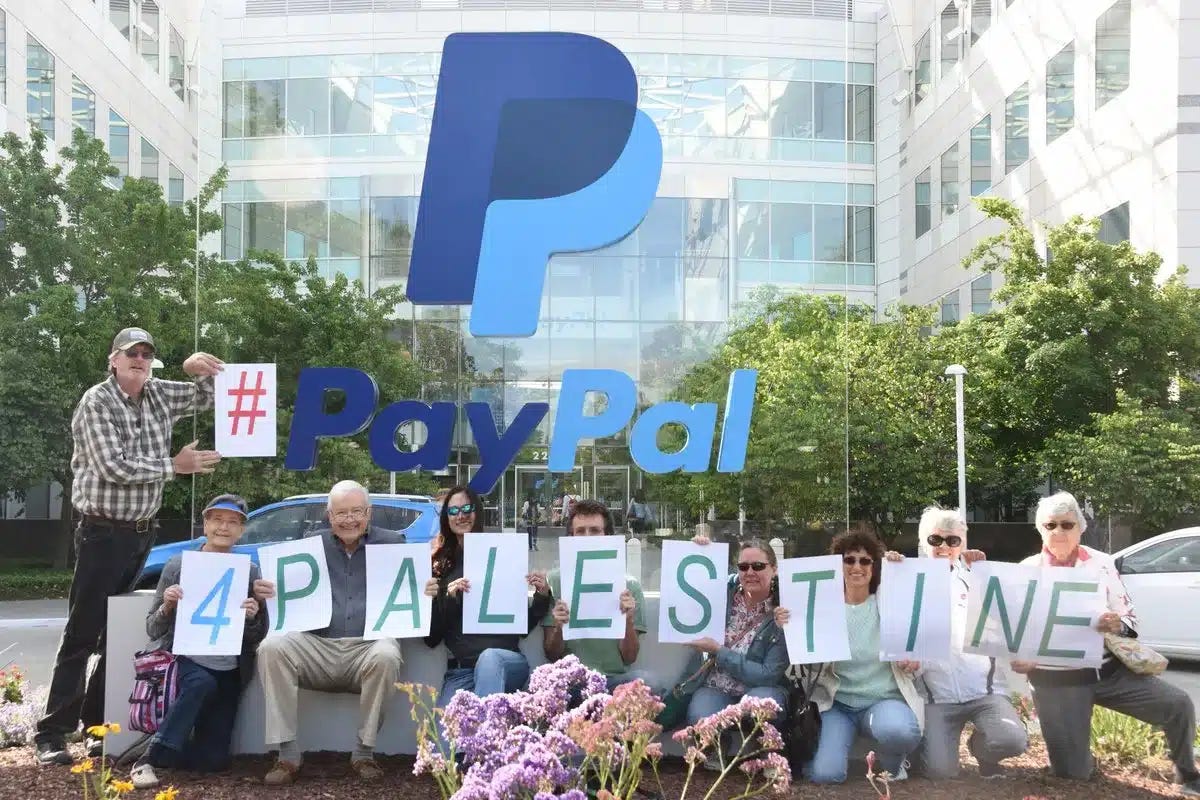Inside a makeshift wooden studio, shielded from the deafening sounds of explosions and shelling across the Gaza Strip, voice-over artist Fawzi Al-Qassas, 33, stands before a microphone, holding a Gulf-accented script. His voice was selected from among twenty freelancers on “Mostaql,” the largest freelancing platform in the Arab world.
Suppressing his frustration after yet another internet and electricity blackout in the workspace he resorted to after his home studio was destroyed, Fawzi says bitterly:
“It’s not just the internet or electricity. Even the money I’ve earned is stuck on the platform because PayPal banned our accounts during the genocide—just because our residence is listed as Palestine.”
Fawzi is not alone. Hundreds of thousands of Palestinians in Gaza and the West Bank had their PayPal accounts frozen since the start of the genocidal war on October 7, 2023—and the ban remains in effect.
Recalling his journey, Fawzi shares:
“I studied financial and banking accounting and found myself in Gaza’s suffocating unemployment line. Freelancing became my lifeline—working with clients from all over the world, earning decent income, with easy payments and a modest 8% fee via PayPal, which I’d then transfer to my bank account.”
Many freelancers in Gaza rely on PayPal to receive payments from international clients, attracted by its seller protection features and seamless integration with freelancing platforms.
Fawzi tells Noon Post:
“After a harrowing displacement and losing all my recording equipment, I found a workspace where I now pay $100 a month just for internet and electricity so I can stay in touch with clients. Even after PayPal banned my account, I’ve been struggling to find costly alternatives to support my family.”
When asked what alternatives he turned to, he replies:
“My brother in Germany has a PayPal account. I used it for two months, but he eventually asked me to stop fearing his account might get banned too. Then I reached out to clients in Ireland, Egypt, Turkey, and Saudi Arabia. We agreed they’d hold my payments until I could collect them via local money changers, though this often meant losing up to 50% of the original amount in commissions.”
Before the war on Gaza, 11 members of the U.S. Congress had urged PayPal to lift its ban on Palestinians in the occupied territories—especially as Israeli settlers were allowed to use the platform. PayPal never publicly explained why it excludes Palestinians from its financial services.
Elsewhere in Gaza, 22-year-old Mahmoud Al-Borno sits before his second-hand laptop, salvaged from the rubble of his destroyed home. Recently released from Israeli prison, he also lost his job as a motion graphics designer and video editor.
“The Israeli genocide turned our lives upside down,” he says, his expression heavy with sorrow. “I lost my first laptop, several members of my family, and the ability to communicate with clients in Saudi Arabia. I was in desperate need of those payments during the peak of the war.”
PayPal wasn’t the only service to suspend operations. Even Western Union halted its services in Gaza, compounding the crisis for freelancers and remote workers reliant on international clients.
“Before the war,” Mahmoud recalls, “my main focus wasn’t just getting paid—it was improving my work and standing out in a competitive field full of talented designers. Payments were simple. I’d get them within minutes through Western Union agents, especially from countries that supported it.”
Long before the ongoing genocide—now in its 23rd month—Gaza’s youth had struggled with soaring unemployment, a result of the Israeli-imposed blockade in place since 2006. Many turned to remote work and freelancing as their only viable source of income.
“With no Western Union in Gaza now,” Mahmoud sighs, “I’m forced to use costly intermediaries who take more than half of what I earn. It makes work nearly unsustainable—but I have no choice. I must keep going for my family.”
“The financial restrictions imposed on Palestinians didn’t begin with this war,” says economic analyst Ahmed Abu Qamar. “They date back years, including economic sanctions on Palestinian banks during the Second Intifada. These restrictions are justified with false claims under the pretext of ‘combating terrorism.’”
He continues:
“During the Israeli blockade, many financial movements in Gaza were restricted in coordination with the international community, which economically covers up Israel’s crimes.”
Abu Qamar explains that the financial clampdown worsened during the current war:
“Transactions in and out of Gaza are now twice as difficult. Numerous digital wallets and platforms—like Binance, PayPal, Western Union, and MoneyGram—have closed accounts holding thousands of dollars. These accounts were Palestinians’ only workaround to the crippling economic sanctions.”
“PayPal has proven effective for financial transfers, operating in over 200 countries. It empowered freelancers and businesses alike with low-cost global transfers. At the end of 2024, the platform had over 430 million active accounts—demonstrating its vast user base. Blocking access in Gaza has dealt a massive blow to the financial lifeline of many, despite the company being well aware of the source of these funds,” Abu Qamar adds.
“Palestinian freelancers and remote workers are now facing a war on two fronts—military and financial,” he says. “Before the war, fees were as low as 2%. Now they exceed 30%, piling pressure on those already struggling.”
Abu Qamar notes that it’s difficult to assess the exact number of accounts affected due to the lack of pre-war data infrastructure in Gaza—a result of the siege and systemic financial marginalization.
He concludes:
“We urge the adoption of USDT (Tether) for banking and transfers. It allows for secure, anonymous cross-border transactions, offering a viable alternative for those living under financial sanctions.”



